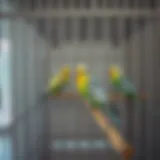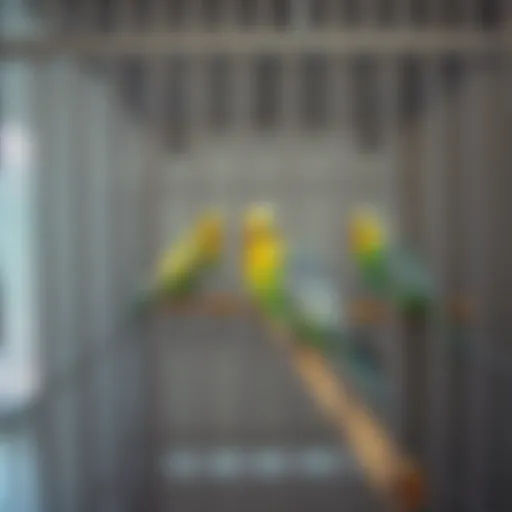Essential Considerations for Bringing a Ferret Home


Intro
Bringing a ferret into your home can be a significant and rewarding decision. However, it is crucial to approach this commitment with a clear understanding of what it entails. Ferrets are active, social creatures with unique care needs and considerations that differ considerably from more conventional pets.
This guide aims to provide insight into various aspects vital to making informed choices regarding ferret ownership. Each point discussed here is critical—and neglecting them could impact not only the well-being of your future pet but also the harmony of your household.
In this article, we will cover the characteristics of ferrets, their care requirements, legal factors, financial impacts, health issues, and the overall effect they can have on family dynamics. Viewing a ferret solely as a source of amusement or companionship often overlooks essential responsibilities.
The following sections will dive into specific considerations that anyone thinking about exchanging a part of their life for the joy of ferret companionship must comprehend.
Foreword to Ferrets
Bringing a ferret into your home requires an understanding of the animal's unique nature. Ferrets are not typical household pets. Their behavior patterns, as well as their social needs and potential challenges, are important considerations prior to making a decision. This section highlights the essence of ferrets – their characteristics and behaviors – to aid potential pet owners in understanding what to expect when integrating this species into their lives.
Understanding Ferret Behavior
Ferret behavior is often characterized by playfulness and curiosity. They are highly active animals, known for their boundless energy and inquisitive nature.
When exploring ferret behavior, it is vital to acknowledge several features:
- Ferrets have a natural instinct to dig, chew, and explore their environment. This can lead to a need for safe and stimulating spaces where they can engage in these natural behaviors.
- Social interaction is crucial. Ferrets are pack animals who thrive on companionship. Thus, they often benefit from having another ferret to play with, or plenty of human interaction.
- Their vocalizations range from chattering to barking, each signifying different emotions or needs. Being able to interpret these sounds can help owners provide better care and connection.
Understanding these behaviors helps in anticipating potential issues. Misunderstanding their energetic nature could lead to frustration. Being informed equips future ferret owners with tools to foster a healthy, happy environment for their new pet.
The Origin of Domestic Ferrets
Understanding the origins of domestic ferrets provides insights into their specific needs and behaviors. Ferrets are a domesticated form of the European polecat, subtly altered by centuries of breeding.
Originating from Europe, the domestication journey of ferrets stretches over two thousand years, primarily for roles in hunting and pest control. As a result, they carry specific traits that influence their lives as pets today:
- Predatory instincts remain strong. Ferrets may develop a hunting heritance that leads them to chase small animals or insects.
- An evolutionary background linked to social bonding suggests that they rely on interaction. Their close kinship with humans shaped their sociable behaviors and reliance on companionship.
- Misconceptions sometimes arise regarding their temperature preferences and habitat needs due to their wild ancestors.
Closure
By comprehensively understanding the instincts and social behaviors of ferrets, future owners can better prepare for their unique needs. Awareness of their historical background helps facilitate a caring relationship that embraces the quirks and necessities of thesedynamic pets. Preparing oneself ahead of time smooths the path for integrating a ferret into a home, enhancing the overall experience for both pet and owner.
Legal and Ethical Considerations
The consideration of legal and ethical factors before bringing a ferret into many aspects. First, awareness of local and regional laws is crucial. Certain areas may have specific regulations regarding ferret ownership. Understanding these laws is not merely a preliminary step; it helps in avoiding potential conflicts with legal authorities and ensures that the future owner can comfortably integrate the ferret into their daily life. Ignorance of these laws may result in fines or, worse, forfeiting the pet altogether.
Moreover, ethical considerations come into play when discussing responsible pet ownership and animal welfare. This section will delve into laws surrounding ferret ownership and the ethical implications for ensuring proper care and treatment of these animals, which are often misunderstood and mistreated.
Legislation on Ferret Ownership
Understanding the legislation on ferret ownership is paramount. Depending on the jurisdiction, certain countries or states may completely ban ferret ownership, while others may require specific licenses or registration. It is vital for prospective owners to thoroughly research regulations pertinent to their living situation. For example, in California, it is illegal to own ferrets as pets, simplifying decisions for individuals residing there but complicating matters for those in regions with varied regulations.
Additional laws may incorporate rules regarding housing, the size of enclosures, or requirements for veterinary care. Specials laws towards exotic pets often lead to expectations that ferret owners must meet, like living standards at certain levels. Failing to comply can lead to penalties, and missing veterinary requirements may impact pet health and wellbeing.
Check credible resources to establish the latest regulations in your area. Websites such as Wikipedia and Britannica, along with local government pages, offer indispensable insights into contemporary laws.
Ethical Implications of Ferret Care
The ethos of pet ownership requires more than just adherence to laws. Prospective ferret owners should reflect on the responsibilities associated with possessing a living creature. A ferret requires attention, affection, and a deep understanding of its physical and psychological needs for healthy companionship.
Although ferrets are generally playful creatures and can adapt well in domestic settings, capturing their unique nature is necessary for ethical interaction.
Common ethical implications to consider include:
- Time Commitment: Ferrets thrive on interaction and playtime. Daily attention contributes to their mental health.
- Proper Habitat: Providing suitably enriching environments, spacious cages, and opportunities for exercise is essential.
- Nutrition: A well-balanced diet tailored to ferrets is crucial, as their bodies process food differently than dogs or cats.
- Health Monitoring: Regular veterinary examinations create a healthcare framework that reflects ethical responsibilities.


These points frame a baseline code of conduct that supports ethical ferret ownership. As responsible pet owners, being aware of the impacts and implications of housing a smart yet resourceful animal like a ferret reward owners with a longer-lasting bond.
Additionally, the journey of caring for a ferret often stretches beyond personal convenience—understanding that any living being contributes to the larger fabric of animal welfare fosters accountability and compassion in their marketplace.
So, approaching pet ownership, particularly of unique critters like ferrets, expands the community of humane treatments.
In summary, attention to both legal statutes and ethical responsibilities solidifies comprehensive and informed ferret ownership. Both aspects work in tandem, promoting responsible behavior and fit lifestyles for ambitious ferret enthusiasts.
Financial Commitment
Understanding the financial commitment associated with owning a ferret is crucial for potential pet owners. This furry creature can bring joy and companionship, but providing comprehensive care requires a financial investment. Ignoring these expenses can lead to difficult situations later. It is important to budget accordingly and ensure that all aspects of ferret care are adequately funded.
Initial Investment for Ferret Care
When beginning your journey as a ferret owner, the initial investment can be significant. First, consider the purchase costs. Registered breeders often charge $100 to $200 for a ferret, depending on the breed and age. This is just the start. You will need to buy essential supplies. A spacious and safe cage is vital. Quality cages designed for ferrets can range from $150 to $300. This shelter serves as both play and rest place.
Additionally, consider bedding, which should be comfortable and suitable for a burrowing animal. Options can be found within the range of $10 to $50. Don't forget about food and water bowls, which will usually cost around $20 combined. Furthermore, it is best to acquire proper food specialized for ferrets. This can set you back approximately $20 for a good stash.
Lastly, new owners should think about initial health checks. A veterinarian visit usually cn cost anywhere between $50 and $150 for vaccinations and health examinations. Overall, budgeting for an approximate initial cost around $400 to $700 ensures a solid beginning for your little friend.
Ongoing Expenses Associated with Ferrets
Ongoing expenses are an important part of ferret ownership to be aware of from the start. Like any pet, the commitment continues long after that initial setup. Activities such as providing quality food become a regular expense. Grain-free ferret food usually goes for $20 to $40 per month. This is crucial for diet well-being.
Another key expenditure is on health care. Routine veterinary check-ups can cost around $75 to $150 yearly, including periodic vaccinations and treatments for illnesses. Investing in a quality pet insurance policy is wise, which ventures typically offer for about $25 a month. This mitigates financial burdens in case any unforeseen health issues arise.
Moreover, spending on cleaning supplies increases because you must maintain hygiene. Estimates reach about $10 to $20 monthly for proper bedding changes and supplies. Enrichment activities are necessary, as ferrets require mental stimulation, costing about $20 to $50 a month for toys and accessories.
Taking comprehensive care of a ferret involves consistent costs that require prior arrangement and proactive budgeting.
Living Environment Requirements
Creating a suitable environment for a ferret is fundamental to their well-being and quality of life. Ferrets are active and curious animals. Therefore, understanding the habitat needs is crucial before bringing one home. Inadequate living conditions can lead to stress, behavior issues, and even health problems for the ferret. Hence, it is important that potential owners assess several elements that contribute to an appropriate ferret living environment.
Ideal Habitat Setup
When preparing a habitat for a ferret, several factors should be taken into account. Ferrets require ample space to move, play, and explore. The ideal setup involves a large multi-level cage. This allows exploration near food and sleep areas while maintaining safe boundaries. Filters in ferret bedding types are also key, with options of soft bedding in the space for comfort.
Here are significant points to consider for the ideal habitat setup:
- Cage Size: A minimum of 24” x 36” floor space is recommended. Ensure the vertical height is enough to accommodate climbing and playful activities.
- Enrichment: Include various toys suited for ferrets. They thrive with stimulating toys that challenge their minds and prevent boredom.
- Rest Areas: Provide hiding places where ferrets can retreat when they feel overwhelmed. This promotes relaxation and reduces stress.
- Ventilation: The dedicated space should have adequate ventilation to avoid buildup of odors and ammonia, aiding better air quality.
By considering these essentials, a ferret can enjoy diverse activities and explorations while feeling safe in their new home.
Safety Precautions for Ferrets
In adopting a ferret, safety is a priority to prevent accidents resulting from their natural curiosity. The environment should be thoroughly ferret-proofed. This involves controlling hazards that could lead to risk.
Important safety precautions for ferrets include:
- Surface Considerations: Remove or secure anything small they could swallow, such as coins, rubber bands, or sharp objects.
- Enclosure: The cage or habitat should securely close to prevent escape and particularly dangerous encounters with open doors or windows.
- Toxic Plants and Substances: Ferrets typically explore by nibbling. Ensure to eliminate access to toxic plants and household chemicals.
- Supervision and Enrichment: Limit unattended roams within your home, as ferrets may get into dangerous spots. Enhancing their environment with supervised playtime can keep them safe and happy.
Overall, creating a secure living environment for a ferret involves comprehensive planning. Incorporating suitable setups allows these unique creatures to live comfortably and safely while meeting their behavioral needs. Ensuing an enriching habitat promotes a happy lifetime companionship.
Investing time into proper habitat preparation ultimately saves future challenges in ferret care.
Health and Wellness of Ferrets
Understanding the health and wellness of ferrets is crucial for potential owners. Ferrets are unique creatures that require specific care to thrive. Addressing health needs not only enhances their quality of life but also enriches the bond between ferret and owner. Notably, being informed about potential health issues and veterinary requirements ensures that the ferret leads a happy and healthy life in your home.


Common Health Issues
Ferrets are prone to certain health issues, most notably adrenal disease, insulinoma, and lymphosarcoma. Awareness of these conditions can lead to early diagnosis and treatment.
- Adrenal Disease: This hormonal imbalance occurs due to adrenal gland tumors. Symptoms may include fur loss, increased aggression, and changes in behavior. Regular check-ups can help identify issues early.
- Insulinoma: High insulin levels cause ferrets to have low blood sugar, leading to weakness, lethargy, and seizures. Watching the ferret's energy levels can be crucial in observing this condition.
- Lymphosarcoma: This cancer affects the lymphatic system and can result in swelling of lymph nodes and decreased appetite. Any notable swelling or sudden weight loss warrants a vet visit.
Ferrets can also face respiratory diseases, dental issues, and skin conditions. Nonetheless, attentive care and observation can lead to a healthy pet.
Veterinary Care Requirements
Regular veterinary care is a cornerstone of ferret wellness. Ideally, finding a vet experienced with ferrets is essential. Comprehensive health care for these animals typically involves the following:
- Routine Checkups: An annual visit is important for vaccinations and general health assessments.
- Vaccinations: Ferrets should receive vaccines for rabies and canine distemper, as these diseases significantly affect their health.
- Dental Care: Dental cleanings and monitoring of their teeth are crucial since dental issues are quite common among ferrets.
- Spay or Neuter: This procedure reduces certain health risks, including cancers and behavioral problems.
- Emergency Care: Being prepared for emergencies is vital. Knowing where to take your ferret in case of sudden health problems can help adjust to any situation smoothly.
Pro tip: Keeping a record of your ferret's health history, including vaccinations and any medical issues, will make veterinary visits more efficient.
Socialization and Behavior Training
Socialization and behavior training are crucial aspects to address before bringing a ferret to your home. Understanding the unique nature of ferrets can enhance your experience as a pet owner. Ferrets need experiences that positively shape their behavior and interactions with both humans and other animals. This section discusses the specific elements behind ferret socialization and behavior training.
Understanding Social Needs
Ferrets are inherently social creatures. They thrive on interaction and require regular engagement with their owners as well as potential mates or other pets. Inadequate socialization can lead to behavioral issues such as biting or excessive hiding.
To ensure their social health, consider the following:
- Contact: Spend quality time playing and handling your ferret daily to create trust and bond.
- Companionship: Adopting more than one ferret can fulfill their social requirements.
- Varied Interaction: Allow your ferrets to meet people, and consider introducing them to safe animals. This helps them adapt to various environments.
Ferrets benefit most from an enriching atmosphere that mimics their natural habitats. Consistent, positive interactions during their developmental stages can profoundly influence their temperament. Address any signs of fear or aggression immediately with positive reinforcement techniques.
Training Techniques for Ferrets
Training ferrets might appear challenging, yet it is vital in safeguarding their well-being. Effective training promotes a balanced lifestyle for your ferret.
Positive Reinforcement
Using treats during training sessions establishes desired behaviors. Ferrets respond remarkably well to rewards, making this method beneficial.* Enjoyable tasks facilitate learning, encouraging repetition of positive behavior.
Tricks and Commands
Simple commands, such as
Integration into Family Dynamics
Assessing Family Readiness for a Ferret
Bringing a ferret into a home should never be a hasty decision. Before making this choice, it is essential to check if every family member is prepared for the unique challenges and joys associated with ferret ownership. Ferrets are lively and require attention, so assessing family readiness is particularly crucial.
Questions to consider include:
- Is anyone in the family allergic to pets?
- Who will overlook the ferret's care on a daily basis?
- Are children old enough to understand pet safety?
Involving all family members in discussions helps ensure everyone is on the same page about responsibilities. Knowing that ferrets need daily social interaction, you should realize the time commitment required for grooming, feeding, and play. A strong support system at home increases the likelihood that your ferret will thrive.
Introducing Ferrets to Other Pets
Integrating a new ferret with existing pets can be complex but is necessary for a successful home environment. Animals have different temperaments, and ensuring smooth introductions is fundamental. The process requires patience and careful observation to assure safety for everyone involved.
Follow these steps for effective integration:


- Create a separate space for the ferret. This area will allow pets to adjust to each other’s scents gradually.
- Supervised introductions are key. Bring pets together under controlled conditions. Allow them to get used to each other without any restrictions.
- Seek positive interactions. Gradually facilitate interactions using treats or toys to create a welcoming atmosphere. This approach encourages a friendly bond over time.
- Monitor behavior closely. Pay attention to any signs of aggression or anxiety from either pet, and be ready to intervene if necessary.
Ferrets can blend well into households with other pets but proper introduction phases are critical. Positive encounters and mutual respect will help create a comfortable living environment for all animals.
Integrating a ferret can be a considerable adjustment for both new and existing pets. Thus, a structured and thoughtful approach greatly improves the chances of harmony in the home.
Time Commitment for Ferret Care
The decision to bring a ferret into your home encompasses numerous factors, and one of the most pivotal is the time commitment required for ferret care. Ferrets are energetic, intelligent, and social creatures. Their needs must be met consistently to ensure their happiness and health. Ignoring the time commitment can lead to behavioral issues and physical health problems, making preparation crucial for prospective owners.
Daily Care Requirements
Ferrets need daily attention. Their care routine effectively consists of various activities that ensure they remain healthy and well-adjusted.
- Feeding: Ferrets typically require high-protein diets. Meal times should be consistent, often necessitating life adjustments around these moments. Meals must include well-formulated commercial ferret food or raw diet components, along with fresh water.
- Cleaning: Their habitat—be it a cage or an expansive area in your home—requires daily cleaning to prevent illness. Keeping their living space clean not only maintains their health and happiness, it shows that you regard their adopted home with respect.
- Playtime: Daily interaction in the form of play is also a must. Allowing your ferret to explore in a safe, supervised area can greatly enrich their lives. 30 minutes to several hours of play can provide crucial mental and physical stimulation.
- Grooming: Regular grooming, including brushing and observing their skin for signs of illness, should become part of your routine. While they groom themselves, they still benefit from owner's attention.
Ferrets thrive on interactiion. An understanding owners hould prioritize consistent affection and socialization, knowing absence in timly engagements can lead to anxiety and potentially aggression.
Long-Term Commitment Overview
Owning a ferret is not a fleeting endeavor. Long-term considerations stress the choices hat will affect daily life profoundly over their lifespan, which ranges from longer than six years, sometimes reaching around a decade.
- Basic Care: Care perpetually demands effort for their comfort and well-being. Ferrets require perennial support and love, as they rely on their humans to teach social behaviors, train them, and ease into adulthood. Proper understanding of their developmental stages mandates ongoing learning from their human counterparts to foster appropriate behavior.
- Lifestyle Changes: Life situations change. You’ll likely face shifts regarding job responsibilities, vacations, or even changes in household dynamics. Understanding these effects on your commitments is essential. Ferrets adapt decently to alterations but will require reassurance and guidance from their owners. Planning on year-round involvement with quality interaction should take precedent.
- Financial Considerations: Even beyond financial expenses associated with medical care and food provisions, one must not overlook time investment. The studies or chores you could pursue can sometimes be sacrificed longer-term for the direct attention required by ferrets.
Investing time for a ferret generally yields fulfilling relationships. A cautious owner should evaluate if they can allocate continuous time to nurture their ferret creatively through both sets of contemplations.
The commitment to caring for ferrets often leads to deep bonds; they exhibit remarkable social capacity, often drawn towards their humans throughout their lives.
Overall, understanding this commitment is crucial before introducing a ferret into your home. Choose wisely and manage your, time alongside fostering connections that will last both the ferret’s and your own lifetime.
Finding a Reputable Source
Finding a suitable home for a ferret is of utmost importance. Where the ferret comes from directly impacts its health, behavior, and overall suitability for your household. Thus, being informed about the sources of your future pet is a key step in responsible ownership.
Choosing the Right Breeder
When considering getting a ferret from a breeder, several factors play an important role. First, investigate the breeder’s reputation. A reputable breeder often behaves ethically and provides proper care for the animals. They will be open about the breeding practices, facilities, and possible health issues.
Here are some considerations when choosing a breeder:
- Health Certifications: Ensure the ferret has been been health-checked. Look for any documentation showcasing vaccinations and veterinary care.
- Clean Environment: Visit the breeding facility, if possible. A clean, spacious, and stimulating environment indicates the breeder values the well-being of their animals.
- Socialization: Observe how the ferrets interact. Proper socialization from an early age can result in a friendlier and more adaptable pet. Good breeders will encourage gentle handling and bonding with their ferrets.
- References: Ask for references from previous customers. Feedback from other individuals who have acquired ferrets from the breeder can provide insight into their experiences.
Adoption Alternatives and Considerations
Not everyone may want to go through a breeder. Adoption is a noble option and presents its own advantages. With many ferrets needing a home, shelters or rescue organizations often provide a welcoming alternative.
Consider these factors when exploring adoption:
- Cost: Adoption fees are generally lower than purchasing from a breeder. These fees often cover vaccinations and other initial medical care, which lowers overall costs.
- Social Behavior: Many ferrets in rescues are socialized and can be tested for behavioral traits. This helps you assess how the ferret will fit into your lifestyle.
- Support Services: Some shelters provide ongoing support or resources to adoptive families. They may offer guidance on how to enhance the ferret’s well-being.
Adopting a ferret can not only provide a home for an animal in need but also can enrich your life with the companionship of a loving pet. Choosing a good source, whether through a responsible breeder or an adoption agency, is crucial. You can successfully navigate the complexities of ferret ownership when equipped with the right knowledge.
Closure
In concluding this guide, the importance of making thoughtful decisions regarding ferret ownership cannot be overstated. Ferrets, while delightful companions, require a significant commitment of time, resources, and attention. They have unique dietary, social, and health needs that potential owners must understand entirely before bringing one into their home.
It explored the key factors influencing ferret care. Understanding ferrets' natural behaviors and disabilities, actions essential for their welfare was addressed. Reviewing the capability to meet legal responsibilities associated with ferret ownership prevents any future legal troubles. Moreover, guests examined the financial position needed for a ferret, from initial costs to periodic veterinary expenses.
Additionally, proper integration of a ferret into family interactions seem significant. It’s vital to assess whether all family members can adjust and support this new pet in their home. The importance of socialization and play in maintaining a ferret's well-being is been noted.
Before someone takes the step of adding a ferret to their family, they must weigh all the consideratons. An informed approach minimizes regrets and enhances the potential for a long, harmonious companionship with these active creatures.
"Investing time into understanding the necessities for ferret care ensures a more fulfilling experience for both the ferret and its owner."
By considering every aspect highlighted in this article, prospective owners can become prepared to enhance their lives and those of their furry friends. Making this informed decision will lead to a rewarding experience for both parties over time.















